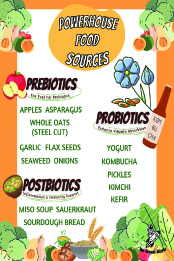Throughout life, we are often told to trust our “gut feeling,” but how many of us truly listen? According to the National Institutes of Health, 20-30 million Americans suffer from digestive issues every year. Excessive gas, bloating, heartburn, ulcers and other serious conditions arise from poor digestion, often leading to additional health concerns such as chronic fatigue, autoimmune problems, and frequent changes in mood.
Maintaining a healthy microbiome within the digestive tract is key to improving gastrointestinal health. Think of a microbiome as a diverse community of organisms, such as a forest, that works together to keep your body healthy. Within the microbiome resides microbes — bacteria, fungi (yeast), viruses, and protozoa. Our bodies are naturally composed of both good and bad bacteria. When an infection or illness arises, it often indicates more bad bacteria present in the body. Using supplements such as prebiotics, probiotics, postbiotics, and zeolites help the body remove waste and absorb nutrients more efficiently. Proper vitamin and nutrient absorption, coupled with a few changes to diet and exercise regimens, may help reduce numerous symptoms related to poor digestion.
It is no secret that eating better can lead to better health, but what does that actually mean? Put simply, eating better means cutting out foods that are harmful to the good bacteria naturally found within our bodies. Things like sugar, caffeine, and alcohol promote the growth of harmful bacteria, which can lead to poor digestion and inflammation. A diet high in water, fiber and lean meats provides our bodies with the energy needed to properly function.
For those with chronic digestive issues, a low FODMAP diet may also help alleviate symptoms. FODMAP stands for fermentable oligosaccharides, disaccharides, monosaccharides and polyols, which are short-chain carbohydrates (aka sugars) that the small intestine poorly absorbs. A low FODMAP diet is designed to help people with irritable bowel syndrome (IBS) and/or small intestinal bacterial overgrowth (SIBO) figure out which foods are problematic and which foods help reduce symptoms. Before trying a new diet or supplement, please consult with a medical professional.
Adding pre-, pro-, and postbiotics, as well as zeolites can promote the growth of good bacteria in the gut. Prebiotics are a form of dietary fiber that act as food for probiotics, facilitating the growth of healthy bacteria. Prebiotics allow good gut bacteria to produce key nutrients for colon cells, which can lead to a healthier digestive system.
Prebiotics can be found in foods such as bananas, whole oats (steel cut is best), apples, garlic, onions, leek, asparagus, seaweed, and flax seed. It is better to consume foods high in prebiotics raw rather than cooked in order to retain the most nutritional benefits.
Once fueled by prebiotics, probiotics work to enhance vitamin and nutrient absorbtion, medication absorption, break down lactose, reduce inflammation, and help strengthen the immune system by regulating cellular activity.
Probiotics are made of good, live bacteria and/or yeasts that naturally occur in the body. Probiotics can be found in foods such as yogurt, kefir (a fermented dairy drink), pickles, kombucha (fermanta tea), and kimchi (fermented cabbage).
New to the holistic wellness marketplace is something called postbiotics. Postbiotics are what remains after foods have been fermented by bacteria. Postbiotics have been found to reduce inflammation, support immunity, and may even help prevent Type 2 diabetes. Postbiotics can be found in miso soup, sauerkraut, sourdough bread, buttermilk, kefir, yogurt, and pickles.
Although these microbes naturally occur within the digestive tract, heavy metals, toxins, and impurities found in our food and water often negatively impact how effective these microorganisms facilitate digestion, compelling us to use vitamins and supplements to maintain homeostasis (inner balance).
Zeolites help alleviate some of the burden faced by the body during the digestive process by encapsulating and safely removing toxins naturally. The cage-like structure and negative charge of the zeolite molecule acts as a naturally occurring magnet for heavy metals and other impurities found in our food, water and air.
When zeolites are paired with prebiotics, probiotics, and postbiotics, the body is able to efficiently digest foods and absorb nutrients. When the body is in homeostasis, an increase in overall energy and sense of wellness can be expected. Zeolites can be found in tincture form (drops) or powder.
Equally important to diet is exercise when we look at digestive health. Aside from weight management, exercise also increases healthy digestion by promoting the movement of food and lymphatic fluid throughout the body. Closely linked to the digestive system, the lymphatic system is responsible for maintaining body fluid levels, absorbing digestive tract fats and removing cellular waste.
It is suggested that 20 to 30 minutes of exercise 3 to 5 times a week is most effective in maintaining digestive health. Gentle exercises such as yoga, tai chi, or qi gong may be practiced to promote deep breathing. A well-oxygenated body is less acidic, which helps prevent excessive bacterial growth.
Light calisthenic exercises such as sit-ups, push-ups, and crunches help digestion and muscle tone, and promote the flow of lymphatic fluid throughout the body. More vigorous activities such as walking, playing pickleball, tennis, basketball, swimming, or biking may also be practiced to help manage weight while improving digestive health.
The key to a healthy body is a healthy gut. Regardless of your lifestyle, making a few simple changes can have a major impact on digestive wellness, so give something new a try. Your body will thank you.

